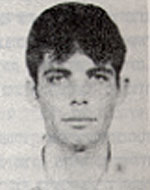Levi, Yosef
Son of Sarah and Israel, one of the founders of the Hartuv settlement, was born on October 18, 1916 in Hartov. He studied at the local school until the outbreak of the 1929 riots, when the family, like all other residents of Hartuv, was forced to leave the village and continued to study and guide his friends in sports. “Shortly before his graduation, he stopped his studies and began to work in the post office, but continued to study privately, and in the winter of 1934 he went to work with his two brothers in a quarry in Migdal Tzedek and specialized in rock explosions. From the mail he received a promise that they would get him back to the service whenever he wanted. He was active in the Maccabi-Avshalom sports association and since the beginning of the 1936 events in the Haganah. “When the Etzel members breached the restraint and began retaliation against Arabs, he too was taken to detention in Latrun with Irgun members, although he did not belong to them from the beginning. He was a guard of religion and tradition, and was influenced by the personality of Irgun commander David Raziel, and when he was released with everyone at the beginning of the Second World War, he joined the Irgun Zvai Leumi. He completed his second year as a lieutenant colonel and became a sergeant in 1942. He began to work in diamonds in Netanya, traveled to Netanya and returned daily to find more time for organizational and practical activities in the underground. “He said. He was arrested and brought to Latrun with the exiles to Eritrea, where he held responsible positions and thanks to his knowledge of the explosion and earthworks, he was instrumental in digging a tunnel through which several members escaped from the detention camp. He returned to Eretz Israel in 1958. He returned to work in diamonds, and was appointed commander of the Irgun in the Tel Aviv District, nicknamed “Gonder Uzi”. And the underground’s secrecy conditions, according to which only a few were allowed to know the commander, would talk to hundreds of members of the ranks, hear their wishes and comments and help many. Yosef participated in preparing the occupation of the Manshiyya neighborhood in northern Jaffa and commanded its implementation. As usual, he also tended to shoulder all the dangerous and dangerous work with his subordinates in the line of fire. Participated in carrying cans filled with explosives from a bombarded area to a protected area. And when it was necessary to blow up houses in order to block the way to British tanks, he also took part. In this action, he and one of his men were shot by a British armored vehicle. The members put them into the lines and transferred them to the municipal hospital where Yosef died of his wounds on April 28, 1948. He was laid to rest in the military cemetery at Nahalat Yitzhak.
